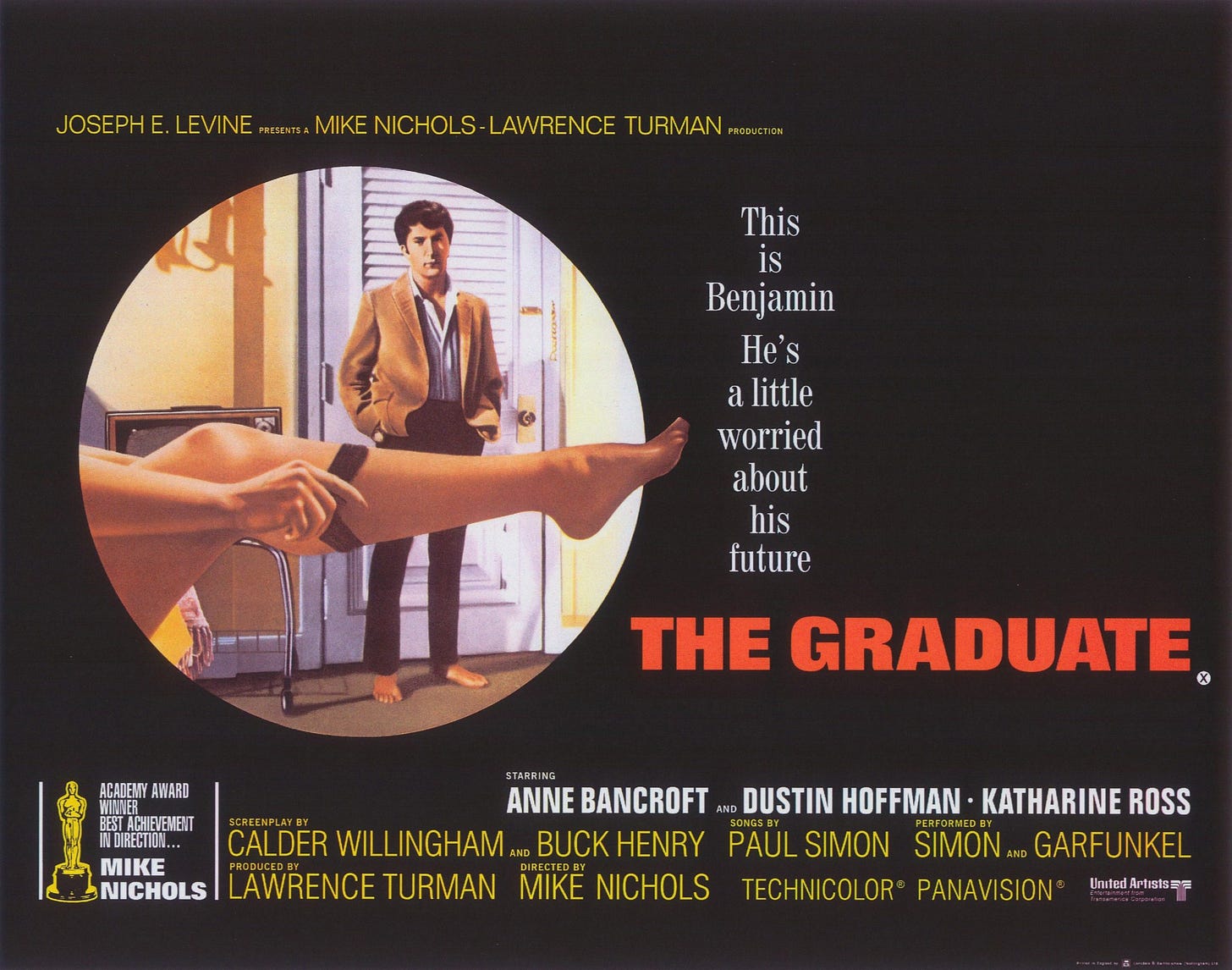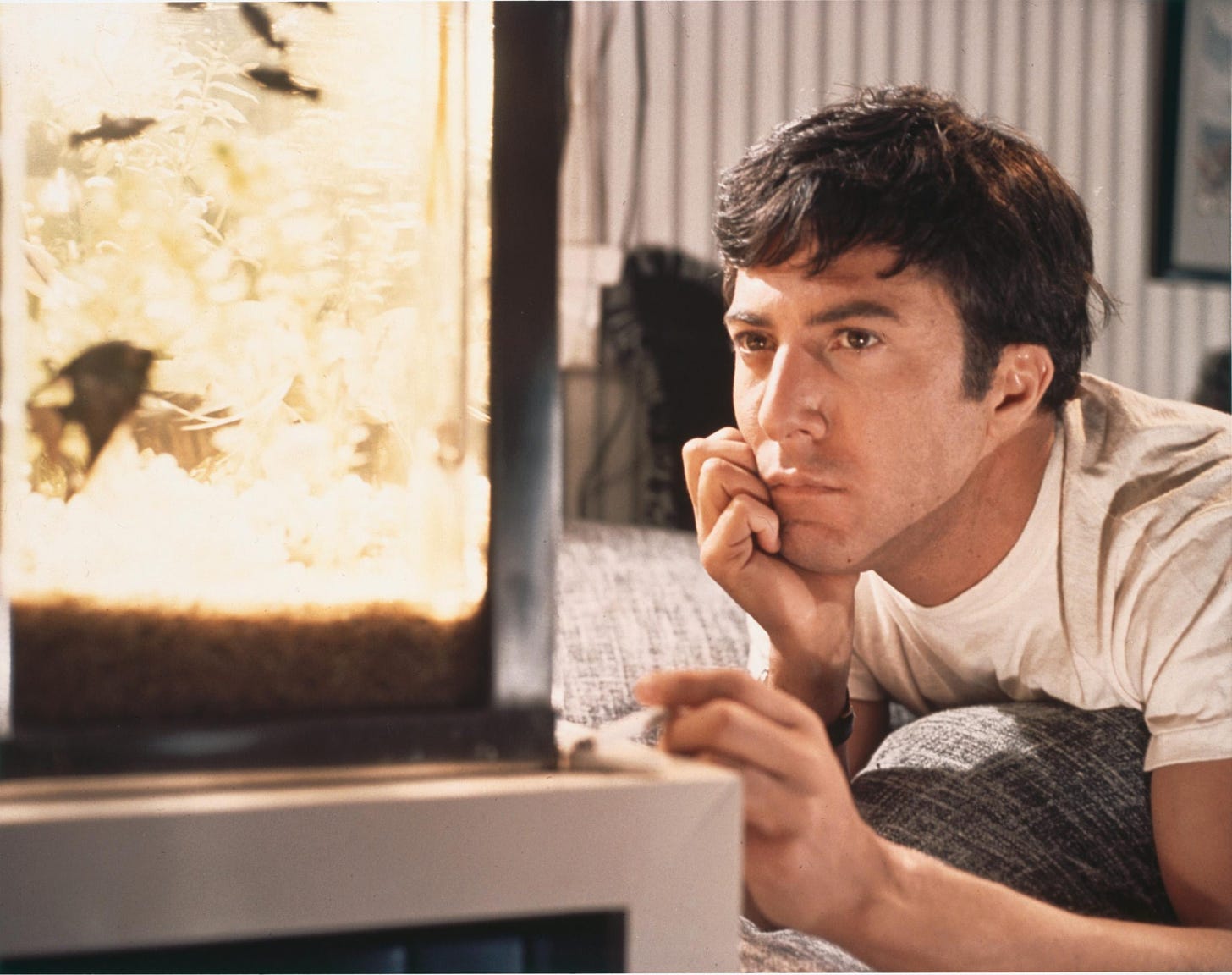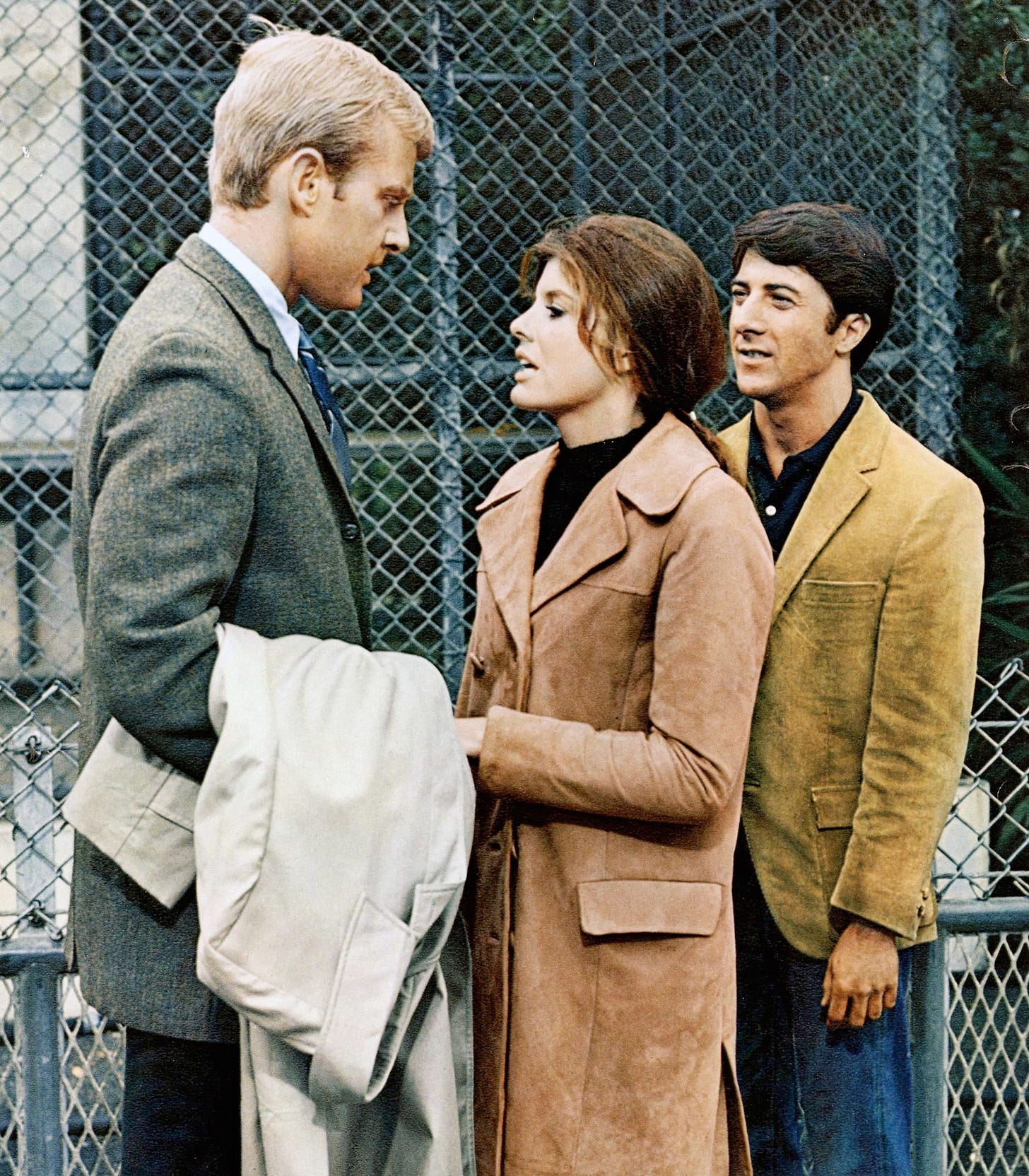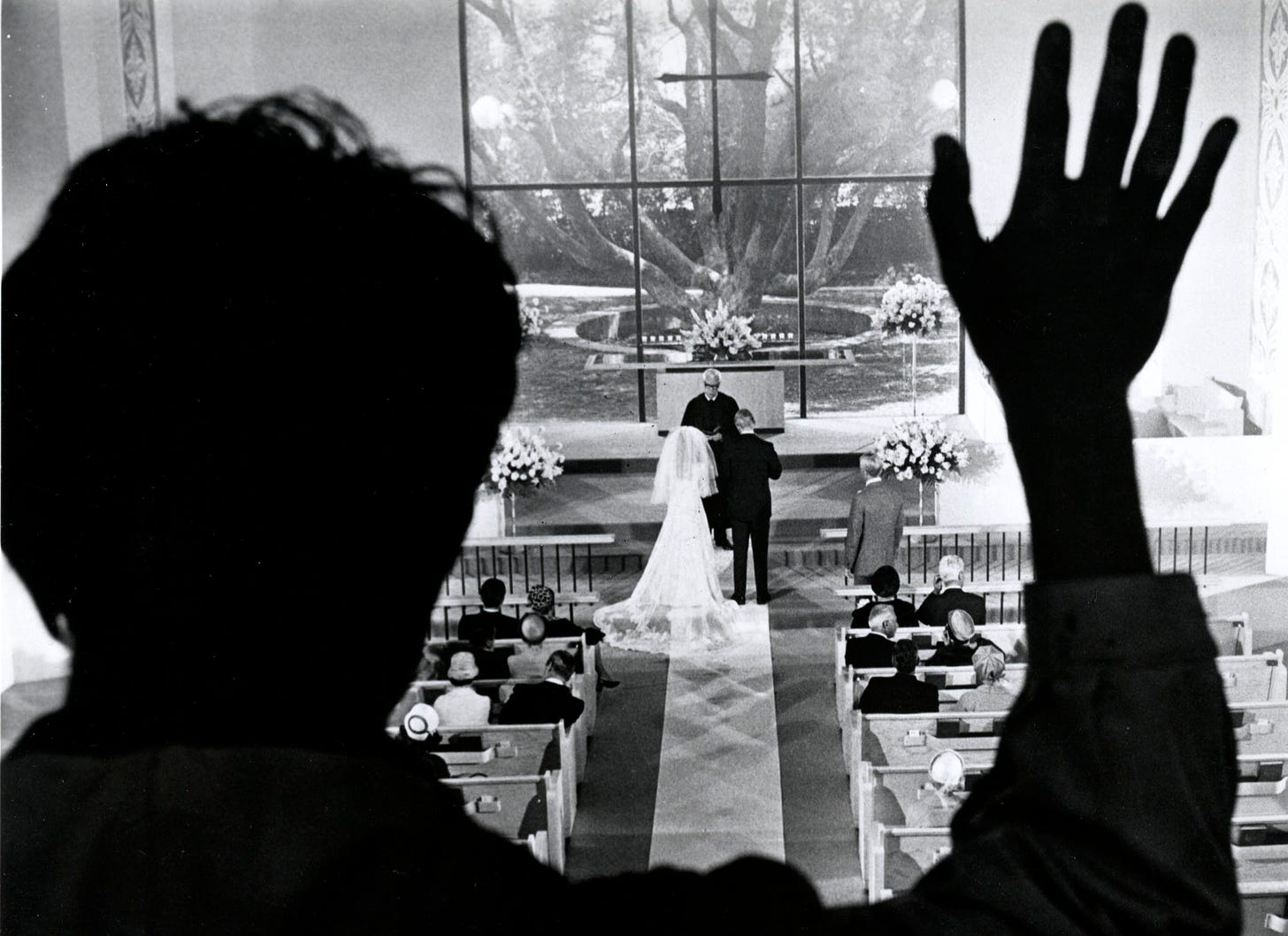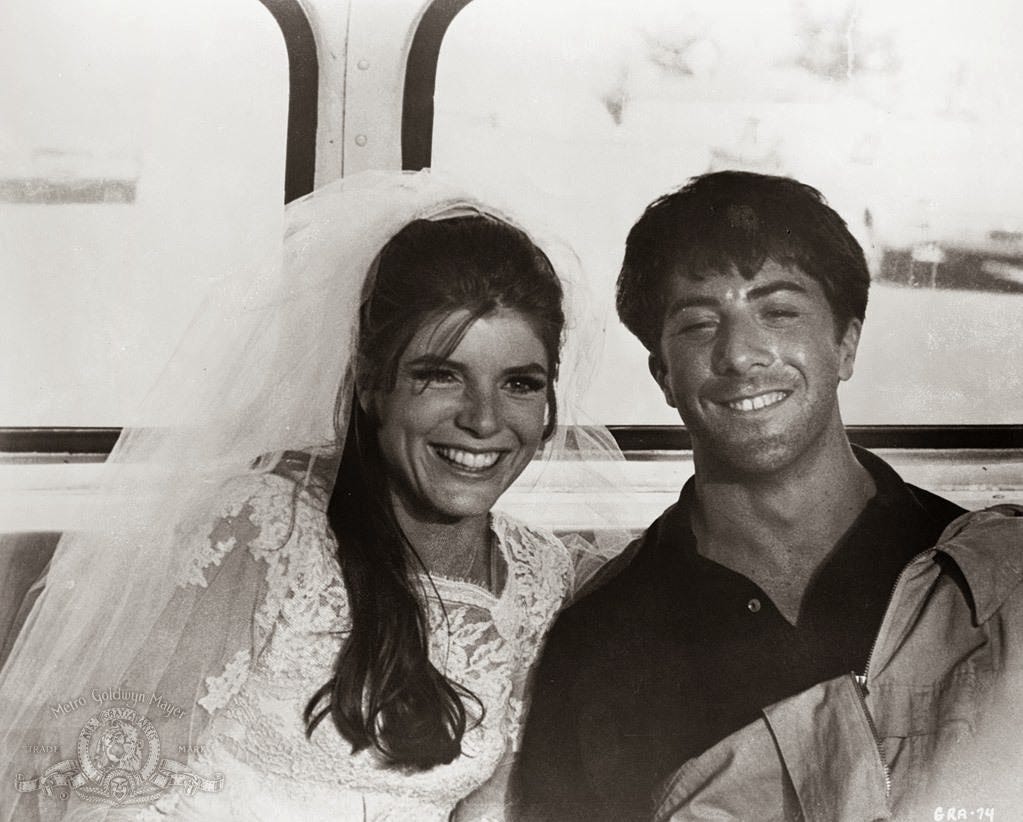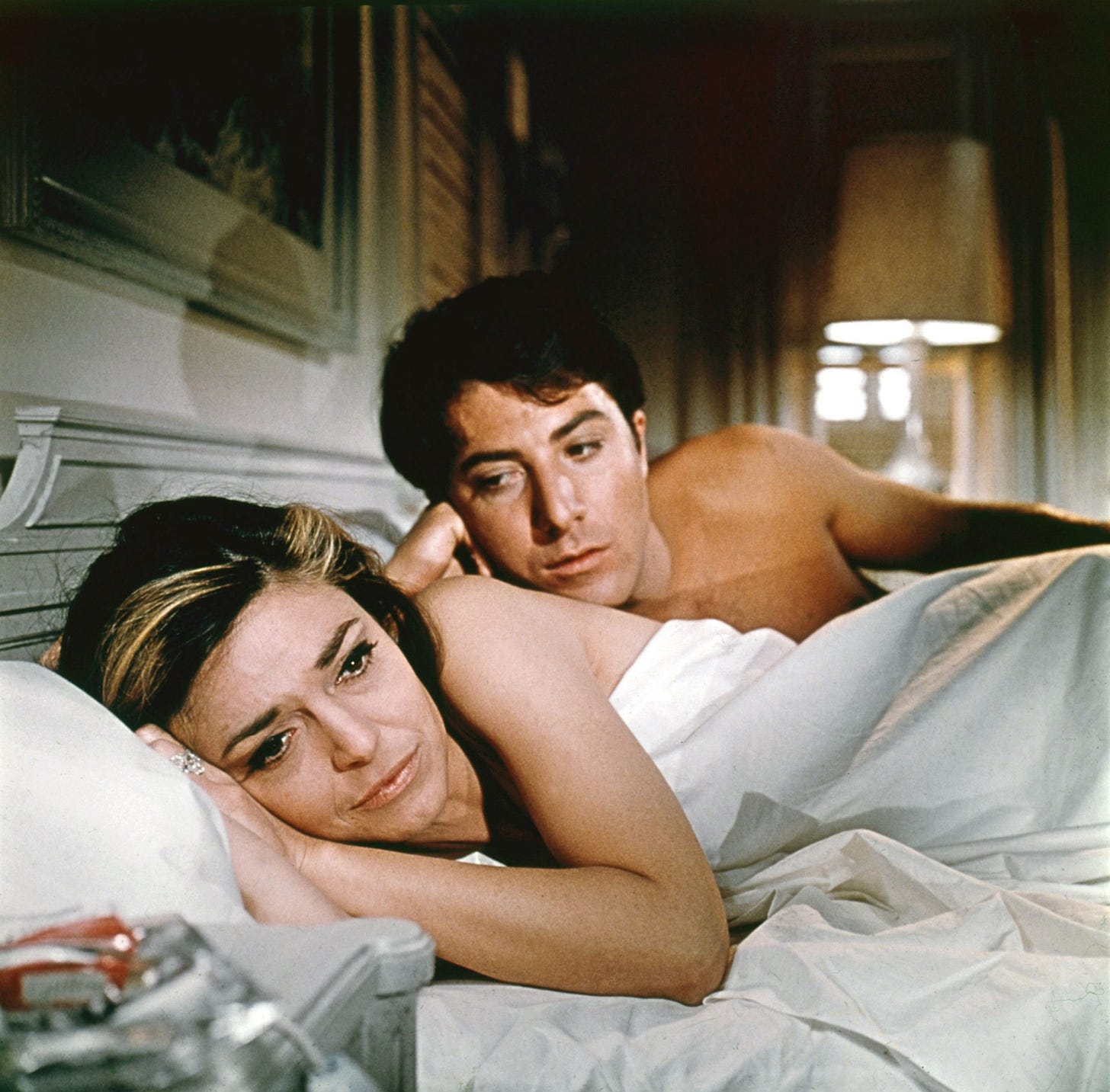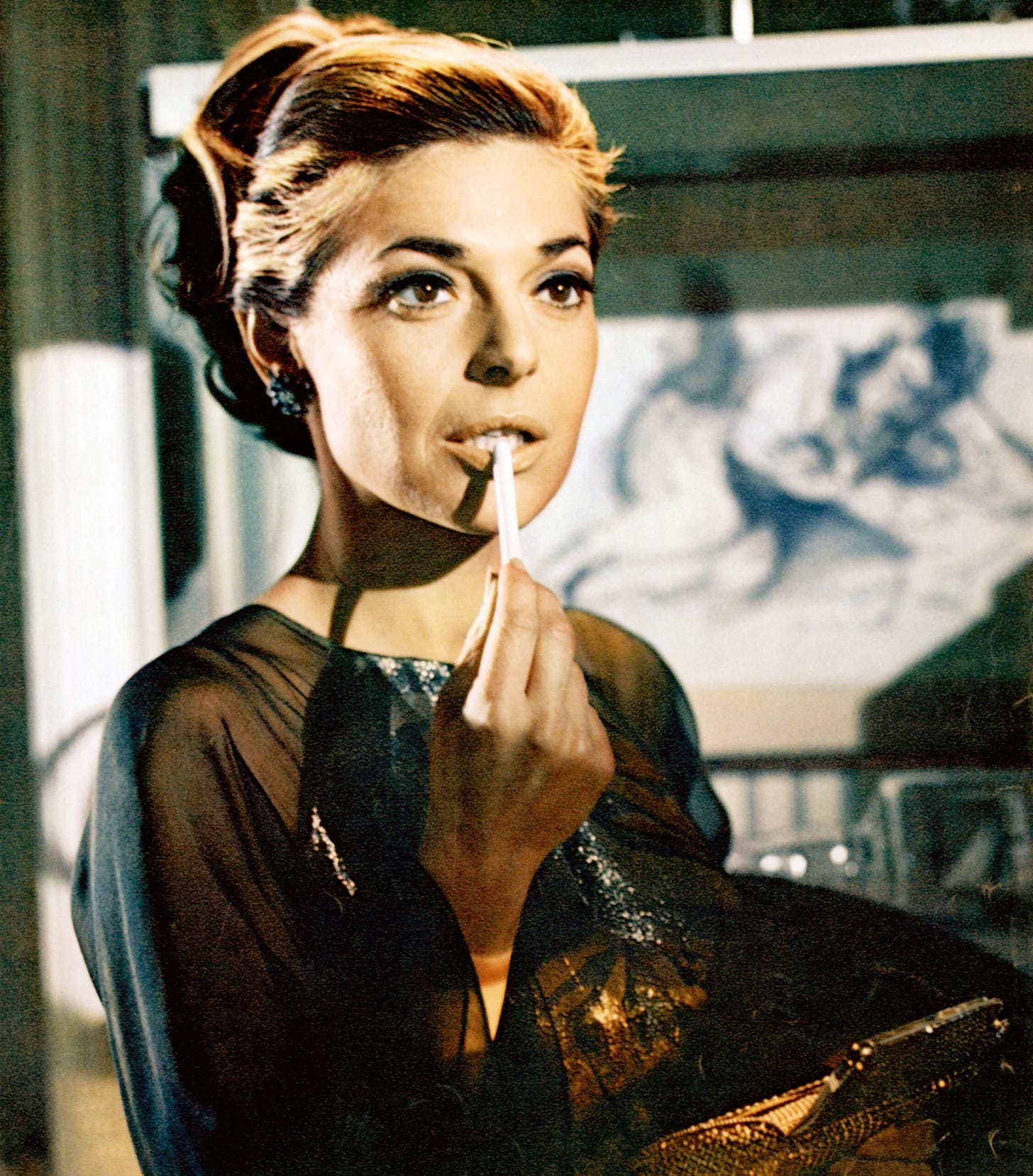Re-release: The Graduate
Written in 2020, a look back at a classic movie that represents the 1960s so perfectly - in fashion, in music, and in it's horribly misogynistic attitudes...
YEAR: 1967
DIRECTOR: Mike Nichols
KEY ACTORS: Dustin Hoffman, Anne Bancroft, Katharine Rose
CERTIFICATE: 15
IMDB SCORE: 8.0
ROTTEN TOMATOES SCORE: 86%
SEX SCORE: 2/5
❌ It fails the Bechdel Test - the two named women (and there are only two!) share two lines of dialogue at the very end of the movie, but they are about Ben so it fails!
✔️ But it is rewatchable. Whatever you might think of the sexual politics and disaffection, it is a beautiful, funny and interesting movie.
✔️ It did inspire fantasies. Not so much about the age difference or the seduction by a older, more experienced person but for the late night assignations at hotels, meeting and fucking and not speaking except to arrange the next meeting. Hot. So hot.
❌ I don’t want to fuck the cast though. Mrs Robinson is glamorous and beautiful and can really wear a pair of stockings but I’d rather be her than fuck her, and Benjamin is just too annoying to contemplate.
❌ This can’t be a sex positive film when so much sexually predatory behaviour is considered sources of comedy!
As always, this contains spoilers so watch the film before you read on...
STREAMING: YouTube (from £2.99). For a full list of streaming options, check out JustWatch.com
[Content warning: sexual assault, predatory behaviour and stalking]
When I originally wrote about The Graduate in 2020, I had only recently written about American Beauty, a movie that encapsulated turn of the millennium ennui as the baby boomer lead character had a midlife crisis and tried to seduce a girl many years his junior, whereas The Graduate told the story of that same baby boomer when he was younger. While similarly disaffected and indulging in a similar existential crisis, complete with little red sports car, he is seduced by a woman many years his senior. And as The Graduate is now over 50 years old, reflecting on how it fits into our lives now is even more interesting to me than the reflections on American Beauty.
The Graduate tells the story of Benjamin Braddock (Hoffman), a recent college graduate who has moved home with no idea about what to do next, nor the motivation to find it, choosing instead to float in the pool and let life pass him by. He is soon seduced by Mrs Robinson (Bancroft), a friend of his parents who is more than 10 year older than him, and they start a secret affair. Despite Mrs Robinson making him swear he wouldn’t date her, Benjamin falls in love with Elaine (Ross), Mrs Robinson’s daughter. She discovers his affair and is revolted but Benjamin pursues and stalks her, persuading her to love him anyway and they end up running away together.
I really like this movie. I sometimes fear that I fall into the trap laid out in Vox and ‘too readily fault a movie from the past for not living up to the political, aesthetic, or ethical standards of the present’ but I don’t feel that way about The Graduate. It’s awkward and most of the sexual politics makes me cringe, but I can still enjoy the movie as I think it captures an age and an attitude so perfectly that it remains kind of beautiful. From the stunning music by Simon and Garfunkel to the classic styling, The Graduate simply is the 1960s and it is beautiful to look at. And more, I love that it offers something different to the viewer depending on the decade that it is seen, most obviously exemplified by Roger Ebert’s changing reviews.
In 1967, Ebert declared it the ‘funniest American comedy of the year’ and even felt that ‘Dustin Hoffman is so painfully awkward and ethical that we are forced to admit we would act pretty much as he does, even in his most extreme moments.’ He was inspired by Benjamin’s actions at the end; he saw him as a hero. Jump forward to 1997 and the movie’s 30th anniversary, and Ebert published a retraction. Being 30 years older himself, he wondered ‘what murky generational politics were distorting [his] view the first time [he] saw this film?’ Now, he sees Benjamin as an ‘insufferable creep’ and a ‘tiresome bore,’ instead celebrating Mrs Robinson as the true hero.
It’s an interesting idea; who is the hero and villain of the story? Because it seems to fluctuate significantly, often dependent again on the generation that watches the movie. Is Mrs Robinson the villain for seducing and corrupting a younger man and then trying to destroy his chance at true love, as the original audience seemed to believe? Or is Benjamin the post-#MeToo villain for being super creepy towards Elaine, persuading her to love him almost against her will? Could it be the Robinson’s for how they treat Elaine - forcing her to marry someone just so she won’t marry the person they feel is unsuitable in a way that seems barbaric to modern audiences? And then there’s the perpetual answer that society and the patriarchy are the villain for making Benjamin, an ‘avatar for disaffected and slightly bewildered youths,' feel so lost after graduating and for making Mrs Robinson feel so worthless and for enforcing their control over Elaine...
Watching in 2020, I know that I watch a very different Graduate from that seen by the original viewers in 1967. I can see much more clearly who Benjamin Braddock has become and it means his youth is fascinating to explore. Benjamin would be 74 now - the same age as Trump - and it’s not too much of a stretch to link his throwaway attitude to wealth, education and relationships to the unempathetic tendencies of people in power now. Does he have a plan? Is he considering others or does he just want to satisfy himself? Does he have any idea of the consequences of his actions? Does he even care?
His dogged pursuit of Elaine fits in this framework too. He has literally no interest in her until he is told that he can’t have her. Their first date was arranged by his parents and he treats her appallingly, taking her to a strip club and ignoring her. It’s only when Elaine starts crying and he tries to stop her from being so upset (because he feels bad or because he doesn’t want to be seen with a crying girl? Who can tell!) that he really sees her and then he falls in love with her. Just like that. One terrible date followed by one aborted second date when she discovers that he’s been fucking her mother, and Benjamin decides that he’s going to marry her. It’s oddly delusional! It’s a decision I’ve made, he says, completely excluding Elaine from the process. Why? Because he can’t have her? Because it’ll somehow make up for how he’s treated her and her family? I accept that she may make him feel something, anything, that makes her seem special in his current apathetic world but I really don’t think he’s considered her happiness.
And there’s no other way to look at Benjamin’s actions in Berkeley except as stalking. Elaine never looks pleased to see him; she often ignores him, replies in monosyllabic answers and is clearly very wary of him. I loved the scene when Benjamin follows her to the zoo and it could really be used as an example of how to recognise when attentions are unwanted. Just look at her body language when she sees him running after the bus, her gritted teeth and curt answers. She clearly doesn’t feel able to tell him to fuck off - as far as she knows, he overpowered and raped her mother so of course she won’t feel safe - but her displeasure and discomfort remain so obvious. Sadly, the clip above doesn’t extend to her meeting up with Karl but that was a textbook great response. Polite but firm when faced with a man who Elaine introduces as ‘following me on the bus,’ and simply removes his date from an uncomfortable situation.
Elaine is the only character who I feel suffers from poor characterisation within the film. She only exists through her interactions with her mother and Benjamin, and her reactions feel largely illogical. Why does she forgive Benjamin so quickly for destroying her family? Why does she seem to accept his creepy behaviour and allow him into her life? I can only explain it by saying ‘because the plot required it.’ I needed more conversations between them - that includes words spoken by Elaine! - to believe that she would want to marry him and want to love him.
I can, however, understand why she ran away with Benjamin at the end. For me, that is the only aspect of her character that does make sense! By that point in her story, she has been taken out of college and literally been forced into marriage ‘one step ahead of the shotgun.’ Karl seems like a lovely man and had proposed to Elaine already, but I can’t imagine he wanted to marry her so quickly to stop her marrying someone else. Of course Benjamin seemed like a good option for Elaine at that moment. She just needed to escape!
The long shot of their faces at the end as they sit in the back of the bus is famous as it goes on just long enough for the realisation of what they have done to dawn on them, to the tune of ‘Sound of Silence’ by Simon and Garfunkel - music that was used earlier in the film to signify Benjamin’s confusion and apathy. They aren’t getting their Happily Ever After. Or if they do, it isn’t with each other! The AV Club felt that in that scene ‘Nichols captures exultation gradually fading into uncertainty and doubt, thereby undermining their ostensible victory. They did it! Now what?’
But from a 2020 perspective, that makes it a better film. It’s more realistic and more believable. Elaine and Benjamin would never have been happy together, but the act of escape does give Elaine at least the opportunity to make her own life. She has been rescued! I don't care about Benjamin’s future so much - he will no doubt fall onto his feet into a job that he’ll claim to hate but will make him a fuck ton of money so he can continue exactly as he always has. Affirming the connection I see with American Beauty’s Lester Burnham, ‘Benjamin is destined for a lifetime of getting what he wants and then getting tired of it.’
My 2020 perspective (time; not vision) also means that I am much more sympathetic towards Mrs Robinson at the end of the film than I expected. Well, not at the actual end because she’s descended into pantomime villain by that point - essentially hissing at Elaine and slapping her - but there was a moment near the end when my heart broke for her. Just after Benjamin has told Elaine that he had had an affair with her mother, Mrs Robinson tells him to leave and the shot zooms out from a close up of her devastated face to reveal that she’s actually standing a long way away, pressing herself into the corner and looked incredibly vulnerable. It’s the moment when the power between them switched and Benjamin became the dominant player in their relationship, and it is so effective.
Because the power was initially entirely in her hands and she does not wield it well. Her seduction of Benjamin is truly horrifying to watch - I’d say it crosses the somewhat acceptable predatory line and becomes assault. I winced at Allisa Wilkinson’s statement in her Vox review that the scene ‘feels uncomfortably close to many of the kinds of allegations that have been made against powerful men from Harvey Weinstein onwards,’ but she’s not wrong! Mrs Robinson asks Benjamin to drive her home and he is reluctant to do even that. She then demands he walk her to the door, then follow her in, then stay for a drink. With each step, Benjamin is clearly uncomfortable and frequently asks to leave. He says no, he says stop, and she ignores him over and over again. The famous scene when he asks if she’s trying to seduce him gave Mrs Robinson the opportunity to rectify the situation, telling the truth and saying yes, allowing Benjamin to consent, but she lies and instead chooses tricks and locked doors and non-consensual nudity. It is assault, and that’s a shame because I don’t think we’re supposed to see it that way. I suspect that it was supposed to be a heavy-handed seduction, demonstrating Mrs Robinson’s desire and power as an older woman, and was almost certainly supposed to be a comedy, but I couldn’t find it funny. It is deeply uncomfortable viewing.
Subsequently, their relationship is more consensual and I was so grateful to see that Benjamin made the next move. It doesn’t forgive her for what she had previously done but it did allow me to enjoy their scenes together in the manner to which they were intended - as comedy: it ‘remains one of Hollywood’s most glorious extended comic duets, with Mrs. Robinson’s sangfroid in hilariously direct proportion to Benjamin’s flustered anxiety.’ It is funny how awkward Benjamin is and they do have great chemistry. I do believe that he wants to be there and his puppy-dog eagerness is kind of hilarious. When I mentioned in the header how The Graduate inspired fantasies of late night hotel assignations, they were like this - funny, hot and consensual!
Time has been kinder to Mrs Robinson than it has to Benjamin and the Mrs Robinsons of the past are now seen with more sympathy; the isolation of a loveless marriage due to an unwanted pregnancy coupled with the loss of independence and self required of wives and mothers is a toxic and painful combination, and I can’t blame her for her self-destructive choices. A 2017 Guardian review agreed that modern audiences feel ‘more sympathetic to [Mrs Robinson’s] midlife crisis, and remember the pathos of her abandoned interest in art’ and the older Ebert in 1997 felt that he had initially underestimated how hot Mrs Robinson was: ‘Watching the 30th anniversary revival of The Graduate is like looking at photos of yourself at an old fraternity dance...But--who's the babe in the corner? The great-looking brunette with the wide-set eyes and the full lips and the knockout figure? Hey, it's the chaperone!’ Famously, Bancroft was only 36 when The Graduate was released but played a character who was considered passed her prime, compared to Hoffman who was 31 but felt easily able to play a 21 year old. I’m not sure that much more needs to be said about how women were valued in 1967!
That sort of sums up why I do enjoy this film, and I’m sad that it could only score 2/5 in my scale so counts as a bad film. Luckily, it's not 1967 anymore and feminism, sexual politics and ageism have come along way since then, although none of those battles are completely won, but The Graduate is so stylish and so stylised that it could never be mistaken for anything current. With the hair, clothes and architecture, it’s practically a period piece and so I feel that it’s now easier to watch dispassionately than it would have been in the 1960s or if it hadn’t been such a stereotype. I can watch it, recognise that that is how life was and acknowledge both what we can still learn and what has already improved for the better. As I mentioned above about the portrayal of Benjamin’s stalking tendencies, it’s almost educational!
And if nothing else, it will always be worth watching because the Simon and Garfunkel music is pretty high on my list of favourite soundtracks. Ebert significantly underestimated the lasting appeal of the songs, describing them as ‘limp, wordy’ and the only flaw of the movie, but I much prefer Peter Bradshaw’s interpretation in the Guardian, recognising that the lyrics of ‘Here’s to You Mrs Robinson’ offers Mrs Robinson a ‘gentle reassurance that Jesus loves her, [providing] a note of final gentleness and forgiveness for this character that is really nowhere in the script.’ The songs and music are so integral to the flow of the movie that I love this subtle and no doubt intentional reminder that Mrs Robinson isn’t really the villain.
Because look around you; all you see are sympathetic eyes...
Enjoying this post? Subscribe and never miss another!
Quick apology for the somewhat erratic publishing schedule! This is likely to continue over the summer but I have new posts planned and more re-runs…they just may not always be posted on a Monday!!
MOVIE DIARY
Anyone But You (Gluck, 2023): Oh my word, Glen Powell is a superstar! This is a pretty funny but not that special romcom that is absolutely carried on Sydney Sweeney’s figure and Glen Powell’s personality…and I mean that as a compliment! This is light and nothing groundbreaking, but it is a lot of fun!
Despicable Me Four (Renaud, 2024): my five-year-old daughter loved it! I thought it was pretty similar to the previous movies, but they weren’t that bad. The minions jokes don’t seem to get old!
The Thomas Crown Affair (McTiernan, 1999): the sexiest movie ever made, the Bond film Brosnan never got to make, my fashion icon as I got older…this has it all! I didn’t mean to watch it all but suddenly, it was gone midnight and I could tear my eyes away. A perfect film!



